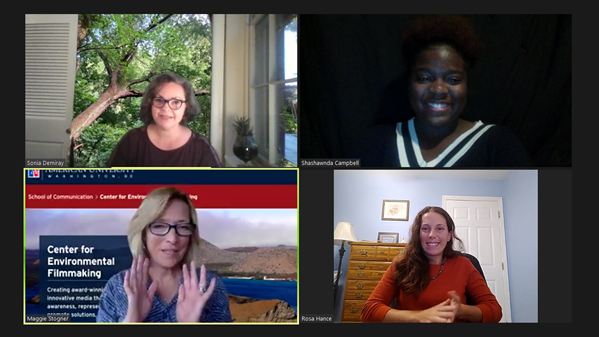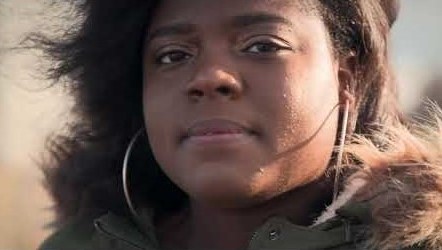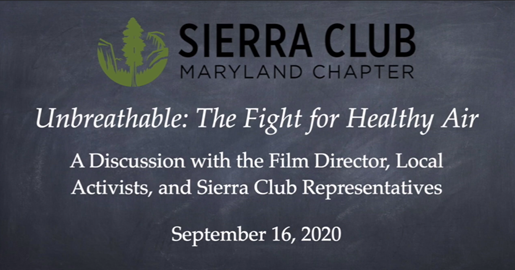
The Maryland Sierra Film Club held its second movie panel discussion on Wednesday September 16. About 50 people attended the online event. The Film Club is a partnership between the Sierra Club Maryland Chapter and the DC Environmental Film Festival to showcase and discuss important films and themes, with a focus on environmental justice.
For this month's film, Unbreathable: The Fight for Healthy Air, Director Maggie Burnette Stogner and one of the featured local activists in the film, Shashawnda Campbell, joined a panel discussion along with Sierra Club Chapter Chair Rosa Hance and Film Club Moderator Sonia Demiray. If you missed the film, check out the great trailer for a sense of it.
Award-winning film describes Clean Air Act's positive impacts and the ongoing struggle for healthy air
Film Club members were lucky to be able to screen Unbreathable for free in their homes this month. Unbreathable is a brand new 30-minute documentary about 50 years of the Clean Air Act and the continuing struggle for clean air for all communities. Beth Gardiner, author of Choked, calls it "A powerful and important film about one of modern America's most consequential laws." The day before the panel, Unbreathable was named Best Environmental Feature film for 2020 by the Chesapeake Film Festival!
Unbreathable was directed by Executive Director of the Center for Environmental Filmmaking Maggie Burnette Stogner, produced by Elizabeth Herzfeldt-Kamprath, and executive produced by the Center for Environmental Filmmaking at American University, with support from the American Lung Association, AU’s Center for Environmental Policy, and the Hanley Foundation.
The film opens with: "Every day we breathe about 20,000 times." A key message of the film is that over the past 50 years, there has been major progress in significantly reducing air pollution across the nation thanks to the Clean Air Act. The Environmental Protection Agency estimates that the Clean Air Act prevented 230,000 deaths by 2020 as well as significantly reduced health complications. However, asthma continues to be the number one health issue for children and nearly half of all Americans across the country today are still impacted by unhealthy levels of air pollution. Unhealthy air can lead to asthma and lungs diseases, but also dementia, heart attacks, cancer and increaed vulnerability to viral infections such as COVID-19.
Another message is that clean air is not a partisan issue, or at least it didn't used to be. Working in a bipartisan way, the US set national air quality requirements and successfully addressed major issues like acid rain and ozone layer protection. President Nixon (R.) passed the Clean Air Act in 1970, President Bush Sr. (R.) passed the Amendments to the Clean Air Act in 1990 with wide bipartisan support, and California Governor Arnold Schwarzenegger (R.) passed the Global Warming Solutions Act in 2006. President Obama's (D.) administration updated the standard for four out of the six air pollutants that the EPA regulates under the Clean Air Act and finalized rules to increase fuel efficiency standards for vehicles. Higher fuel efficiency leads to less emissions and therefore less ozone and particulate matter pollution.
Panelists discuss local health impacts of dirty air and the importance of community activism
Panelist Shashawnda Campbell, featured in the film, is an activist and founder of the South Baltimore Community Land Trust for community led development without displacement, permanently affordable housing, and zero waste infrastructure. She launched a movement to protect her community from air pollution while just in high school and shared powerful messages about coming together as communities and using our voices.

The dynamic panel discussion included first person accounts of local issues and activism, including pushing back against polluting industry and the Wheelabrator incinerator in Baltimore. See the clip below.
For more information
American University's Center for Environmental Filmmaking Unbreathable website has more information on the film and how to arrange future screenings. The website also links to some great resources, including the American Lung Association's 10 Tips to Protect Yourself from Unhealthy Air. One of the tips is: "Always avoid exercising near high-traffic areas. Even when air quality forecasts are green, the vehicles on busy highways can create high pollution levels up to one-third a mile away."
For the October Film Club, we will focus on the 2020 elections with a film so new, it’s barely here yet: Generation Green New Deal. You can watch Generation Green New Deal free this month, ahead of the next panel discussion to take place on Thursday October 15. Please send questions for the panelists to filmclub@mdsierra.org.
Hope you can join us!
